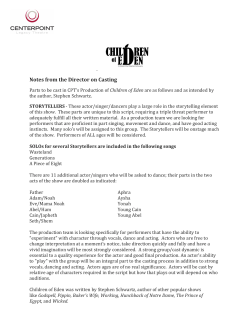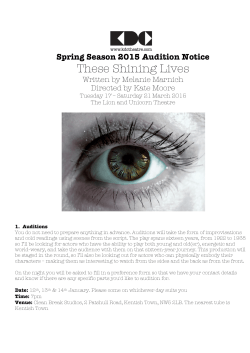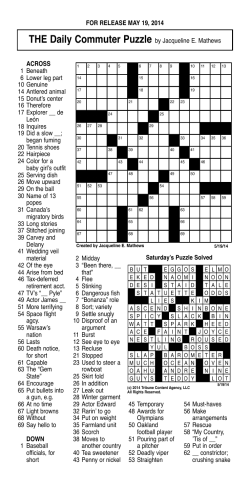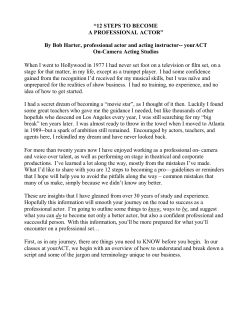
Play Production Handout Hints PDF
Name _______________________ Handout Due Date ________________________ Play Production: Some Thoughts about Presenting a Successful Play at the Middle School Level SUCCESS? Answer for Question 1 What does a play production need in order to be a successful one? What does success mean? Is a play successful when the audience truly enjoys the presentation that they see? Is it successful when the actors are having fun during the dramatic process? Is success when all the technical elements make the play pleasing to watch and listen? When the audience buys all the concessions during intermission, and making money for the drama class? Maybe it is a combination of these definitions, OR maybe it is something else? Dictionary.com defines success as: noun 1. the favorable or prosperous termination of attempts or endeavors; the accomplishment of one's goals. 2. the attainment of wealth, position, honors, or the like. 3. a performance or achievement that is marked by success, as by the attainment of honors: The play was an instant success. 4. a person or thing that has had success, as measured by attainment of goals, wealth, etc.: She was a great success on the talk show. Synonyms (Thesaurus.com) : accomplishment, achievement, advance, benefit, boom, fame, gain, happiness, profit, progress, prosperity, realization, triumph, victory, win, arrival, ascendancy, attainment, clover, consummation, eminence, fortune, fruition, hit, killing, laugher, maturation, reward, savvy, sensation, snap, strike, bed of roses, big hit, do well, easy street, flying colors, good luck, good times, grand slam, gravy train, happy days, lap of luxury Sometimes you can define a word, like success, by listing what it is NOT; its opposites or antonyms. Antonyms (Thesaurus.com): failure, poverty, flop, defeat, forfeit, loss, misfortune, sadness, sorrow, unhappiness, inferiority, unfulfillment. Needs for a Performance Answers for Question 2 & 3 Found Here My high school drama teacher once said that in order to have a performance, you need performers, a place to perform, and an audience to watch the performance. He said that to my class over 35 years ago, and yet I still remember it, mostly because it is so simple to remember. It also makes sense. If you take away one of the three elements, you can’t have a performance. What – Aristotle AGAIN??? Answer for Question 4 found here Aristotle said that a play (he called it drama) can be described in six parts: Plot (the events of the story), Thought (the lessons or morals of the story), Characters (who is in the story), Diction ( what the characters say), Spectacle (what the audience sees), and Melody (what the audience hears) Answers for Q 5 & 6 not in the reading But Who’s Responsible? Answer for Question 7 found here Actor or Technical Staff, or Both- Who is responsible for the Plot of the play? Well, the actors are responsible for telling and acting the story accurately according to what the playwright had in mind. They have to memorize the words of the playwright. They have to figure HOW to say the words: When the line is “Are you going with me,” does the actor say it in a begging way? In a sarcastic way? Impatiently? Scared and afraid? AND does the director have a say how the lines are delivered? Does the director want the story (plot) acted in a comedic way? In a realistic way or in an exaggerate way? AND does the costumes and music help with the style of the production? I think so? Let’s continue with this idea: Actor, Tech, or Both - Who is responsible for the Thought (theme) of the play? The characters? The Diction? Spectacle? Melody? Page 1 Name _______________________ Handout Due Date ________________________ Why do a play at all? Answers for Questions 8 & 9 found here There are many reasons why plays are performed. Sometimes it is just for play entertainment. No lessons, no seriousness, just plain old silly fun. Can you think of a movie or story that was nothing but silly, silly, silly. OR, maybe the purpose is more serious. Maybe the playwright, or even the director, created the play to inform their audience about something that was important to them, in a didactic way – to teach the audience something. The novel – and then later the play – Uncle Tom’s Cabin by Harriet Beecher Stowe showed pre-civil war audiences the horror of slavery. (Abraham Lincoln joked when meeting HBS “ So this is the little lady who started this great [civil] war.) Ancient Greeks created plays, especially tragedies, to create a catharsis experience – to remove pent-up emotions. Emotions, when kept bottled inside, can be harmful, and going to a Greek tragedy was a way to release the emotions inside. Think about it – why do people go to see a scary, horrific movie? Maybe the play was created to just make money. Movies take a success film, and make sequel, after sequel, after sequel – because they know the audience will come to see it. They know their audience. When we as students in a middle school write a play, can we write about anything we want and then perform it in front of the school, or in front of our friends and family ( and in front of our younger brothers and sisters -- sorry, but the answer to that question is No) Steps of a Production Answer for Question 10 is found here / Question 11 is here in green Preproduction planning is the first step: What play will we do? Why do that play? Do we have the resources to do that play? Just because you see a dramatic movie filled with special effects does not mean that movie will transition will to a live stage production. Do we have enough money to make the play happen? If we don’t, how to we raise money in order to do the show? Who do we pay? Who doesn’t get paid (volunteers). Where are we going to produce it? What type of stage is best for that play? (Proscenium stage? Arena Stage? Thrust stage?) Who do we get to play the parts? Do we get a big named movie star to play the lead part? A famous actor will bring out more people to see the play, and that means more paying audiences, but the star-actor will want to be paid more than an unknown actor. All these ideas have to be planned out. Once the planning is started, you gather all the creative people together and figure out who is responsible for what: Directors- in charge of the artistic concept – the look and the thought of the show; the director will be in charge of the actors. Stage Manager – Assists the director in run the rehearsal smoothly, and takes over running the show during the performance, so that the play maintains the director’s concept Technical Director – In charge of all things technical – anything the audiences sees (spectacle) the director says what it should look like and the TD makes it happen. TD has a crew of leaders, and each leader is in charge of their part of the show. And there are a lot of technical leaders: Costume Designer, Scenic Designers, Lighting and Sound Designers, Make Up Designers, Set and Props Designers. Each leader has a team of people who build what needs to be built. Publicity is key: they get the word out to the public so they want to come and see the show. House Manager is in charge all the people who make the audiences stay at the theatre a pleasant one. (Tickets, restrooms, programs, concession items before the show and during the intermission, souvenirs at the end of the show) The TD makes sure that ALL OF IT gets done ON TIME, so that the show can be performed on the date stated in publicity The Rehearsal Process Answers for question 12 are here Actors are selected during the auditions. An actor auditions to be in a play in several ways. Cattle Calls – Actors needed in crowd scenes in the background. Monologues: Actors perform a preplanned memorized scene to show the director, or casting agent, what they are capable. Cold reading: Actor acts a scene from the actual play with very little preparation or rehearsal (do the actors’ natural reactions “work” for that particular production). Interview: This type of audition is usually reserved for famous actors, to negotiate and to plan how the actor will be used in the play. Page 2 Name _______________________ Handout Due Date ________________________ Answers to Q 13 are in blue – Compare and contrast Once the play is cast, all people involved – actors, director, technical director, and the head of each crew, sits and reads and listens to the play as it is read through. During the read through, the director explains and refines their concept for the show, so everybody hears what and how the show will look. This is also where the actors discover their Super Objective: What the character generally wants during the whole play. The actor discovers if the characters are Static (emotions stay the same throughout) or if the characters are dynamic (how the emotions change during the show). Blocking- Director describes how the actors move in the scene. The actors write their blocking (where and when they move) on their script. They don’t have a set to rehearse in yet, because it is being built by the tech crew while the actors are rehearsing. The director makes sure the actors movements will fit the area where the scenery is suppose to be. After Blocking, Then next step of the rehearsal process begins: Working the scene, or “stop-start” During this process, the director stops the rehearsals and discusses with the actors the motives and needs of the characters. This is the only time where a rehearse will be interrupted, either by the director or by the actor. This “stop-start” can be tedious, and many actors may resent this part of the rehearsal, but it is use to plan out the characters emotions as the play goes along. The actors develop an objective for their characters (What do I want as a character at this time of the play) and what inner dialogue or subtext the character is has (What are the inner thoughts of the character OR what is the character really saying when they say their lines) Answers to Q 14 here in Green Also Extra Credit answer to Question 17 After a certain point, the actors must rehearse without the script in their hands – Off Book or Off Script. At this point the actors can start the REAL ACTING and that is REACTING to what (and how) the other characters. You CANNOT start acting unless you have your line memorized, and acting is more than remembering lines. ACTING IS REACTING. And the more times your rehearse a scene, the more confident you become, the more you are able to repeat the emotions of the character without breaking character. Prompting (telling the actors their lines – the stage manager or prompters job) is allowed. The actors learn to give and take, to react. When the actors have had a few rehearsals without book, the play then is rehearsed and polished with several run throughs – rehearsing the entire play without interruption. While the actors are rehearsing, the tech crew is taking care of the NON ACTING parts of the play. Costume Designer and crew- Clothes the actors where so that the audience will believe the characters. What time period is the play, what is the characters economic status, do the costumes fit the actors, does there have to be several costumes for one actor to denote a passage of time (would you wear the same clothes as time passes or would you have different clothes), does the clothes reflect the weather and climate. All of these ideas have to be planned out. Set and Scenic Designer and crew help paint the scenery: Is it cheaper to have an actual house built on stage, or does it only have to “look” realistic? And does the style of acting match the style of the scenery (realistic, symbolic, impressionistic, natural, surreal) Does the mood of the play match with the Lighting and the Sound. Is the music the right music for the time period. Does the sound have to come from a certain direction on the stage (A door bell ringing from stage right when the front door is stage left – hmmmmm). Does the make up make the actors seem real under the bright lights. Is there special make up needed for a young actor to appear old? Does the actor have to look as if they got a sunburn? Or is there a hospital scene where the character has to look injured? Or is there a monster in the scene, and what does that look like? What props does the actor carry on stage? Do the props match the time period (Would there be a phone for a play in 1910, and what doe s that phone look like?) Is the publicity crew advertising the play in a way that entices the audience to see the show without telling too much of the plot. (Why watch a comedy if all the best jokes are told in the advertisement). Are the names of the actors spelled correctly in the program? Does the House Manager have enough tickets and programs for the audience? Answer to Question 15 and 16 are on this page and the next – Some of the answers have to come from you All work as a team or as an ensemble in order to make the theatrical experience for the audience a magical one. Page 3 Name _______________________ Handout Due Date ________________________ Answer to Extra Credit Question #18 During the Tech Rehearsal, all the technical elements that were being constructed are now used for the first time with the actors. Both tech and cast (actors) practice with their new costumes and set and make up and lights and sound and …… during the Dress Rehearsal. And then the performance can be given. How much time? Question 16 Usually, one page on a movie script is one minute of watchable film and one hour of rehearsal and preparation, depending on how complex the movie is A theatre script is one page, 90 seconds of watchable performance. A standard 90 page play usually take 80 hours of rehearsal and construction Robin Lee in his book Everything About Theatre! Breaks down the rehearsals into percentages: After the read through Blocking : 20%; Stop Start rehearsals 25%; Off book should be before the halfway point of the rehearsals; Rehearsals off book 5%-10%; Run through the entire play without stopping 25%-30%; Technical Rehearsal 5%; Dress Rehearsals 5%. Rules I Should Know Answers to Question 19 Be kind and polite to everyone. Theatre is a small world, and your reputation will get ahead of you before you even audition. If you are known as a difficult person to work with, no one will hire you for work. Bring your script to every single rehearsal. And a pencil, and write your name on your script. If you lose your script, you are usually out of the play Communication is critical. Talk to your director or tech director. Get phone numbers, and call if there is an emergency. Follow the rehearsal schedule, and be EARLY to rehearsal. Don’t have the cast wait for you to arrive. NEVER be late for your entrance on stage. If you can’t enter the stage on your cue, the director may find someone else who can. If you can’t hear what is going on stage, COMMUNICATE that to the director. Respect the resources that are given to you. You may sudden think it is cool idea to throw your crown on the floor when you the king is angry, but the props person will have to fix or replace it. Or if something is borrowed, and it is broken, the person who lent it to the theatre may not let you use their stuff ever again Avoid contact with the audience before a performance. You cannot create a “world” on stage as a character if the audience keeps seeing you as the actor. And no texting members of the audience during the show nor during intermission Leave your valuables at home. The dressing room does not have a security guard to protect your stuff. If you must bring something valuable, make sure it is locked away with the stage manager or teacher until the end of the show. Before your perform, make sure the props you need are in the place where they are suppose to be NO TALKING BACK STAGE. Your voice will carry to the other actors on stage who are trying to concentrate on their part – they don’t need to hear what you are planning on doing after the show. Keep your costume clean. Do not eat your dinner while in costume, in fact you shouldn’t be eating anything with your costume on. Especially if it is borrowed or rented. If a problem arises during rehearsal, talk to the crew head or the stage manager. If the problem is not solved, then talk to the director. Follow directions when given, and do so with a sense of cheerfulness. A good attitude will go a long way Never interrupt a rehearsal unless you are doing a stop-start rehearsal. Do NOT leave props or costumes on the floor. That is a big disrespect for the resources being used. Put them neatly where they belong. Costumes should be hung up, and props placed on a table. Do not put your costume on a prop table. If there is no place for your props or costumes, let the crew head or the stage manager know. Page 4 Name _______________________ Handout Due Date ________________________ Questions – Write your answers on your own paper. Number the question you are answering on your paper. These questions require more than “one sentence answers.” 1) What do you consider to be a successful play production? How do you know if a play is not successful? Can a play have problems and still be successful, and explain what you mean. 2) Explain what are the Needs of a Performance, AND explain how a performance is not possible if you take away the audience. Take away the performers. Take away the place where it is performed. 3) Explain how a performance is possible without some of the other technical items. No costumes. No props. No lights. No sound. 4) AGAIN—list the six parts of a play, and describe each part 5) The Tools of an Actor were not mentioned in the reading, but they are the actor’s Mind, Voice, and Body. Describe how each tool is important to the actor in creating a character 6) Write 12 words that start with the Letter T. Now write a sentence using most of those words. You have just made a tongue twister. Write why actors use tongue twisters as part of their preparation (The answer is not in the reading, but it is related to the Tools of the Actor) 7) Copy this chart on your paper, and explain who is responsible for each part. Some of the chart is completed for you as an example - - copy the example Plot Actor The actors are not suppose to change the story that the author wrote. They should try to convey the events in the play as they are written Thought Diction How the actors say the lines will make a difference on the meaning of the lines Characters The actors portray the characters in a performance in a way that the playwright had intended. Spectacle Technical Crew The director will choose a concept that will emphasize the moral of the story The lines in the play will help the tech crew figure out what props and costumes are needed in the show The audience see a lot of technical elements of a story, including the costumes, scenery, props, and other things. Melody 8) Re read Why do a play at all? Why type of movies or plays do you like to see? Why do you like them? Do you think that the movie or play was created for that reason? 9) If you were to write a play about something important so that it would be didactic without being to preachy, what would your play be about? Why do you think that the audience should know about your important topic? Would you do the play as a serious drama or as a comedy. Why ? 10) Why is preproduction an important part of the Steps of a Production? 11) How is the Acting Director and the Technical Director the same? How are they different? 12) Describe the four types of auditions 13) How is the super objective and the objective different? 14) Why do you think the reading says: REAL ACTING is REACTING? 15) What is an ensemble? Why is it important for a play production to work as an ensemble? List three way you can think of how the cast and the crew can work as an ensemble 16) Why must the actors be off book before the half way point of a rehearsal? Page 5 Name _______________________ Handout Due Date ________________________ Extra Credit Questions 17) If you are on stage, and you have no lines for several pages, are you acting? (The answer is Yes) What are you suppose to do if you are on stage for a long time and you have know lines. 18) What is the difference between a Technical Rehearsal and a Dress Rehearsal? 19) Which of the Rules I Should Know do you think is the most important, or if not THEE most, maybe you can list the top 3 rules. Which rule on the list doesn’t make sense to you? Page 6 Name _______________________ Handout Due Date ________________________ Play Production: Some Thoughts ... ( ) Letter in parenthesis = The first letter of the word [Page-paragraph] Across 2. (S)Accomplishment, fame, progress, or flying colors [Page 1 paragraph 1&p4] 3. (B) Director describes how the actor moves [P3 p2] 5. (R) Real acting [P3 p4] 8. (S) One of the Needs of a Performance [P1 p6- place] 12. (P) The events of a story [P1 Aristotle] 13. (T) the lesson or moral of the story [P1 Aristotle] 16. (D) In charge of concept and actor [Page2 paragraph4] 18. (O) What the character wants at that moment[P3 p3] 21. (C) To remove bottled up emotions [Page 2 paragraph1] 22. (S) Two wordsInterrupted rehearsal[P2 p3] 24. (P) First Step of a Production [Page2 p3] 26. (M) Audition with a memorized speech [P2 Last] 27. (M) One reason to Do a Play At All [Page2 p2] Down 1. (P) One of the Needs of a Performance [Page1 paragraph6 - actors] 2. (S) What the audience sees [Page1 Aristotle] 4. (I) Two Words- Inner Thoughts [Page3 paragraph3 – two words “dialogue”] 6. (D) To teach[Page2 paragraph1] 7. (C) Two Words- Audition for crowd scenes [Page2 last paragraph] 9. (D) What the characters say [Page1 Aristotle] 10. (C) Two Words- Audition with little rehearsal [Page2 – Last paragraph] 11. (C) Who is in the story [Page1 Aristotle] 14. (S) Two words- Runs things smoothly [Page2 paragraph4] 15. (P) They get the word out [Page2 paragraph4] 17. (S) What a character wants throughout the play [Page3 paragraph1] 19. (F) Antonym for Success [Page1 paragraph5] 20. (E) All working as a team [Page3 Last Sentence] 23. (A) One of the Needs of a Performance [Page1 paragraph6] 25. (P) Tell the actors their lines [Page3 paragraph4] 26. (M) What the audience hears [Page1 Aristotle] Page 7
© Copyright 2026









